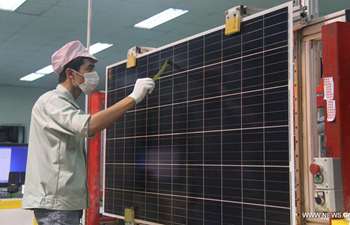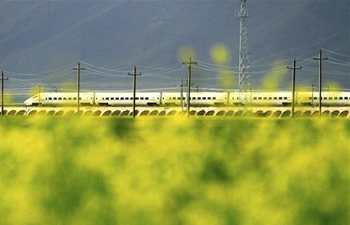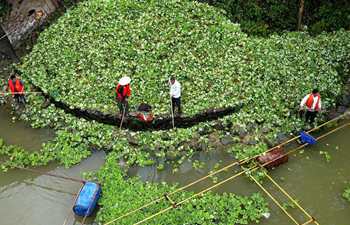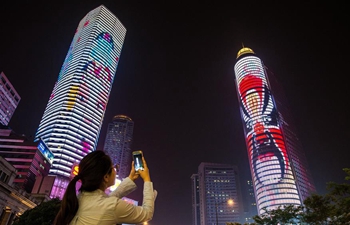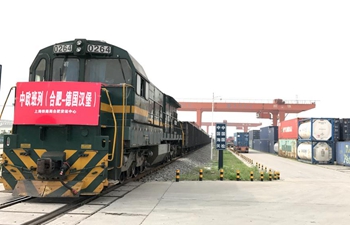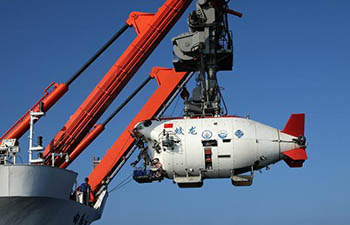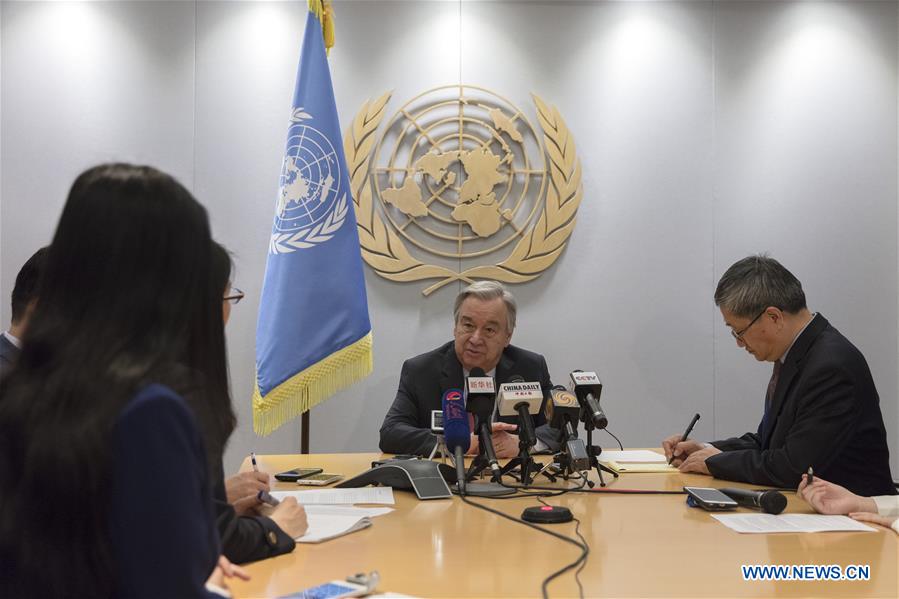
United Nations Secretary-General Antonio Guterres(C) speaks during an interview with UN-based Chinese media outlets at the UN headquarters in New York, May 8, 2017. Guterres on Monday spoke highly of China's Belt and Road Initiative, saying "China plays a very central role" through it in uniting the world in addressing today's global development challenges. (Xinhua/Li Muzi)
by Xinhua writer Gu Zhenqiu
UNITED NATIONS, May 9 (Xinhua) -- UN Secretary-General Antonio Guterres on Monday spoke highly of China's Belt and Road Initiative, saying "China plays a very central role" through it in uniting the world in addressing today's global development challenges.
The UN chief, in an interview with several UN-based Chinese media outlets, made the remarks prior to his attendance at the Belt and Road Forum for International Cooperation, scheduled for May 14-15 in Beijing.
"When we look at a the Belt and Road Initiative, we see a very important contribution to this solidarity in addressing global problems with international cooperation, where China plays a very central role," the UN chief said. "So I am very happy that I have the chance to participate in the Belt and Road summit."
STRONG PILLAR OF MULTILATERALISM
"China has been a strong pillar of multilateralism," which serves as a sound basis for solving global problems, he said.
"We live in a globalized world, we face enormous problems -- climate change, population growth, food insecurity, water scarcity in many parts of the world," he said. "We understand there is no solution for this problem at the country level, the solution must be at the global level."
"So we need globalization, but we need the globalization (which) is more fair than the globalization in the past," he said. "So we need multilateral governance institutions. Multilateralism is the solution for the global problems, and China has been a strong pillar of multilateralism."
Asked to use just one sentence to describe the most important feature of the Chinese initiative, he said: "I think what it demonstrates is a vision of how important it is not only to connect the countries, but also to connect the peoples to address the global challenges of today."
The Belt and Road Initiative, proposed by Chinese President Xi Jinping in 2013 and comprising the Silk Road Economic Belt and the 21st Century Maritime Silk Road, is aimed at building a trade and infrastructure network along ancient trade routes connecting Asia with Europe, Africa and beyond.
The initiative has so far gained the support of more than 100 countries and international organizations, and more than 40 of them have signed cooperation agreements with China.
Guterres knows why it has won wide world attention. "Because we felt that in the moment in which many people doubt about globalization, in the moment in which many people doubt about free trade... We need the initiatives of international solidarity" to "make people believe that free trade can benefit all, to make people believe that's possible not to leave anyone behind."
IMPORTANT INSTRUMENT
The Chinese initiative can also be an important instrument for the global undertaking to carry out the Agenda 2030, a blueprint for the worldwide efforts to achieve sustainable development in the next 15 years starting from 2016.
"This (the forum) is an excellent opportunity to see of the projects that the Belt and Road Initiative is developing," he said, adding that the upcoming high-level forum can facilitate discussion, in which people can see "how we can extract the maximum possible value of the Belt and Road Initiative for global inclusive and sustainable development."
Touching upon the contribution of the Chinese initiative to the implementation of the Sustainable Development Goals (SDGs), he said: "The two things move in the same direction."
"The investments that are made, especially the investment in infrastructure to facilitate contact among peoples, to facilitate trade, to facilitate development, are an important part of the Agenda 2030, and they relate to several objectives of the sustainable development," Guterres said.
It is important to cooperate with China in South-South cooperation, which is "one of the priorities in the activities of the UN, not to replace North-South cooperation," he said.
The initiative is also conducive to "building a community of shared future for mankind," a Chinese concept that has won global endorsement and has been incorporated in several UN resolutions, just like the Belt and Road Initiative.
The UN Security Council on March 17 adopted a resolution to renew the mandate of the UN Assistance Mission in Afghanistan (UNAMA), which also urged further efforts to implement the Belt and Road Initiative and other regional development efforts.
INTEGRATION INTO NATIONAL PROGRAMS
The sound implementation of the Belt and Road Initiative lies in its good integration into the national development programs or strategies of various countries, the UN chief said.
"If it is not well integrated into the strategy of development of a country, it can have counter-productive aspect," he said.
"The UN organization can be very useful for the countries where this project will be implemented in order to enable government to take maximum profit of those projects and to integrate them into their own development strategy and into their own Sustainable Development Goals programs," he said.
"It (The initiative) is exactly doing the projects that are uniting countries, benefiting countries, namely, infrastructure that links different regions of the world. We are creating exactly that kind of shared prosperity that your president was offering," he said.
"This reveals a very important strategic breakthrough and I think the Belt and Road Initiative is demonstrating that new vision that China has brought to global development," he said.
"We are in the beginning of its implementation. But I think that there is now an enormous amount of enthusiasm, so I must say that I have high expectations," he said.
Guterres' upcoming visit will be his second trip to China in half a year and it will also be his first trip to the world's second largest economy as UN secretary-general.
"It's a very simple message to say how much we cherish the Chinese engagement in strengthening multilateralism, to strengthen the multilateral institutions, to strengthen the United Nations, to cooperate in finding global solutions for global problems, the leadership, for instance, in climate change response, how much we count on the Chinese engagement in relation to those objectives," he added.
At the end of the interview, he wrote down a signed message -- "With my best wishes of success for the Belt and Road Forum."




